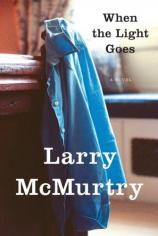When the Light Goes
Review
When the Light Goes
One
of the pleasures of reading fiction comes from meeting characters
on the pages of a novel you truly would want to encounter in real
life. My personal introduction to Duane Moore, the protagonist in
Larry McMurtry's WHEN THE LIGHT GOES, comes late in his life. But
Duane seems like an endearing fellow nonetheless, and he and I
might have a few things in common to discuss over a beer.
Duane first appeared as a rowdy young "good-old" Texan in THE LAST
PICTURE SHOW (1966), though he wasn't a major character.
Subsequently he became the focus of McMurtry's writing in
TEXASVILLE (1987) and DUANE'S DEPRESSED (1999). While Duane has
been around for many years, I must confess that WHEN THE LIGHT GOES
represents our first formal introduction. Therefore, I may be at
somewhat of a disadvantage in discussing his life experience.
After a two-week trip to Egypt, Duane returns to his Texas hometown
of Thalia and to his oil-drilling business now being run by his
son, Dickie. Thalia is Duane's lifelong residence, and the title of
the novel is in part a reflection on the demise of the west-Texas
community. There is little left in Thalia for Duane other than his
office, the family home he generally avoids, and the few surviving
employees of his company. Two years earlier, Duane's wife, Karla,
died in an automobile accident, and Duane now confronts the lonely
life of a man in his late 60s with very little to inspire
him.
Thus, it's expected that WHEN THE LIGHT GOES would be about loss,
death and growing old viewed from many different perspectives. But
what may be surprising is that this is primarily a tale about the
reawakening of Duane's sex life, told by McMurtry in glorious and
full detail. The light may be going out in Thalia, but it's burning
brightly in Duane's libido.
Indeed, the opening line of the novel is a reference to the breasts
of Annie Cameron, a young oil engineer who has been hired by
Duane's company. The relationship between Duane and Annie is the
cornerstone of the book, and it turns out to be a relationship
that, in many respects, is the opposite of what the reader expects
from the initial meeting in the Thalia office. In fact, the role
reversal for Duane and Annie may be one of the more interesting
aspects of WHEN THE LIGHT GOES. Equally intriguing is Duane's
relationship with his psychiatrist, Honor Carmichael, whose method
of treatment for Duane can only be described as somewhat
non-traditional.
Larry McMurtry is an author of great renown. LONESOME DOVE, his
1985 western epic, won him a Pulitzer Prize, and in 2006 he
received an Academy Award for the screenplay for Brokeback
Mountain. McMurtry continues to turn out wonderful novels that
touch upon the foibles and vagaries of the human condition. Duane
Moore may not be Rabbit Angstrom, but in McMurtry's hands, he is a
character who has much to say about life. I hope that WHEN THE
LIGHT GOES isn't Duane's final opportunity for observations on the
human condition, because I would like to hear a little more about
his life outside of the bedroom.
Reviewed by Stuart Shiffman on January 24, 2011
When the Light Goes
- Publication Date: March 6, 2007
- Genres: Fiction
- Hardcover: 195 pages
- Publisher: Simon & Schuster
- ISBN-10: 1416534261
- ISBN-13: 9781416534266





